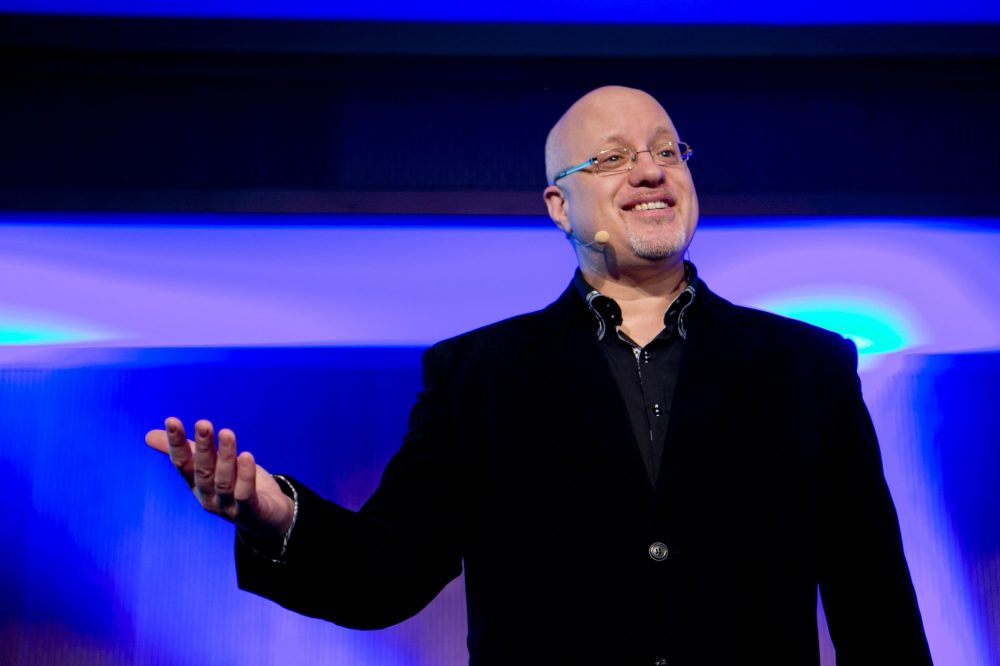An EMERGE Pre-Conference Interview with Speaker Brett King
By Elizabeth Vivirito, Financial Health Network
 Brett King
Brett King
We sat down with Brett King, futurist, innovator, radio host, founder of a neo-bank, to hear how he’s thinking about the future — and what the threats and opportunities are to banks, credit unions, and technology companies.
You sit in a very unique place in our industry — you’re pretty much the eyes and ears of the most cutting-edge technology, ideas, and investments around the world — and regulatory strategies in the U.S. Without asking our readers to download the hours of podcasts you’ve produced, or read your volumes of books… can you distill down how you think technology is going to disrupt our society over the next 20 years or so?
If you look at historical periods of disruption, you can start to make some predictions about what’s coming. The Augmented Age will bring about a huge rethink of processes involving dynamic decision-making… it’ll be about disruption of information, intelligence, and advice. Specifically, Artificial Intelligence will change how we get advice; distributed, embedded experiences will enable contextualized products and services offered to us; smart infrastructure will radically disrupt the energy sector; and gen editing and healthtech will enable us to eliminate many hereditary diseases and diagnose better.
What do these changes mean for Americans, on a day-to-day basis?
For 100 years, employment has been moving from big industry to services. As new technology becomes ubiquitous, employment patterns alter irrevocably. This is going to cause massive social effects — yet at the same time, we’re going to see even more efficient profits, led by technology companies. So the question is: how can we prepare for the employment displacement — especially for the middle class — while we become more efficient producers. Will humans work less and will have more leisure time? Or will we have a net loss of employment?
What do you think is the most pressing financial challenge for today’s consumer or entrepreneur?
Managing their current and future financial health. This is a huge business opportunity for banks and technology companies — but very few are looking at it. Everyone is thinking about what AI and machine learning will mean for our industry, how to partner with or acquire fintech, or cutting-edge payments technologies. But if you go back to what every American is thinking about on a daily basis — it’s their financial health. You solve that problem for them, you’ll get access to a huge market share.
In your book The Augmented Age, you look at several sectors, not just banking. What can we learn from products in other spaces that can teach us something about what will come to financial services?
Let’s take an example from healthcare wearables: integrated health management is coming to our physical health. Healthcare providers are already thinking about using contextual mobile alerts to give people information when they need it — blood pressure changes, immune system response, elevated glucose levels. This sort of “contextual” clues to guide you in decision-making will come, even if more slowly, to banking.
What is the most important thing that people working in banks, credit unions, or fintech companies should do over the next 5 years that will make a difference in consumers’ lives?
Enable access to every single product in real time via mobile, without a signature. And it’s going to be foundational in people’s ability to improve their financial health — but it’s got to start with real-time access, to all products, without a signature. There shouldn’t be a need to go into a bank to get access to products — small business loans, mortgages, anything. We can offer these services digitally, and we should. But the challenge today is the legacy of the branch-model in the US, and the regulations they’re contending with. It’s incredibly challenging to focus on investing in digital experience with so many resources tied up.
What’s your personal mission statement?
Don’t tell me it can’t be done.
